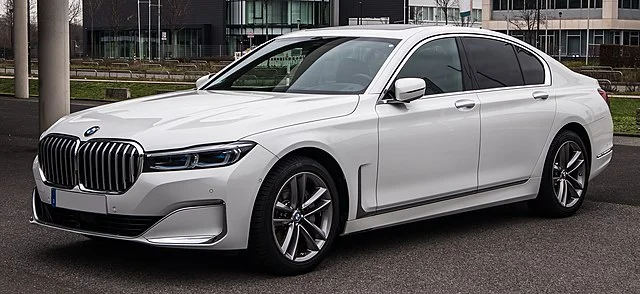The BMW 7 Series Years to Avoid
We've rounded up everything you need to know about the BMW 7 Series years to avoid so you can make an informed used car shopping decision when looking for your next luxury vehicle.

The BMW 7 Series has been a strong competitor in the luxury sedan market, rivaling the esteemed Mercedes-Benz S-Class. With its seventh generation introduced last year, the 7 Series offers various configurations, including a powerful twin-turbo V8 and a hybrid option. The all-electric BMW i7 is also available for those interested in an electric luxury sedan.
However, not all model years of the BMW 7 Series have been created equal, with some years being more prone to problems than others. In this post, we’ll explore the BMW 7 Series years to ensure a reliable and enjoyable ownership experience.
Which BMW 7 Series Years to Avoid?
Below, we have rounded up the worst 7 series years to avoid due to known reliability woes, recalls, expert ratings, and consumer complaints.
DOWNLOAD THE FREE APP
The CoPilot car shopping app is the smartest way to buy a car. Get a curated list of the best cars for sale in your area, as well as notifications if a similar vehicle is listed nearby at a lower price. CoPilot is the smartest way to shop for used cars.
The Early 2000s BMW 7 Series: A Rough Patch
The early 2000s were a particularly troublesome time for the BMW 7 Series. The 2002 and 2003 models, in particular, were plagued with a host of issues that left many owners regretting their purchase. Electrical problems were rampant, with owners reporting everything from malfunctioning power steering to faulty sensors.
For example, the 2002 BMW 7 Series, particularly the 745i model, has been known to suffer from various electrical gremlins. Owners have reported problems with the transmission overheating, check engine lights, malfunctioning audio systems, and rapidly draining batteries. Additionally, the air conditioning and passenger seat restraint systems have been prone to erratic behavior. These issues often led to costly repairs and significant downtime, leaving owners stranded and frustrated.
The 2005 model year wasn’t much better, with many owners experiencing similar electrical problems as well as issues with the car’s air suspension system. The air suspension, which was designed to provide a smooth and comfortable ride, often failed prematurely, leading to a jarring and uncomfortable driving experience. Repairs for this issue could easily run into the thousands of dollars, which many used car buyers should steer clear of.
THE MOST RELIABLE YEAR FOR THE BMW 7 SERIES
If you’re interested in this vehicle, it’s critical to get the most out of your expenses. What is the most reliable BMW 7 Series year available?
The Late 2000s BMW 7 Series: More Trouble Ahead
As the decade wore on, the BMW 7 Series continued to struggle with reliability issues. The 2006 and 2007 models were particularly problematic, with many owners reporting problems with the car’s iDrive system.
For instance, the 2006 model has been a source of headaches for many owners due to its numerous powertrain problems. Transmission failure has caused the vehicle to hesitate, slip gears, or suddenly shift into neutral or park while in motion. These unpredictable behaviors are often accompanied by the illumination of warning lights on the dashboard, such as the ominous “transmission fault” indicator. In addition to the transmission troubles, the 2006 BMW 7 Series has been known to suffer from a loss of power, rough shifting, and a sluggish response when attempting to accelerate.
On the other hand, the 2007 model year grappled with annoying electrical issues. According to owner complaints, water leaks in the 2007 BMW 7 Series wreak havoc on the car’s electrics, frying control modules, and fuse boxes. Airbags and seatbelts go haywire, while gremlins drain batteries dry. Engines surge and stall unpredictably, leaving drivers white-knuckled and wary. Mysterious “energy parasites” sap the car’s lifeblood, making every trip a high-stakes gamble – the list goes on.
The 2008 and 2009 models didn’t fare much better, with many owners experiencing problems with the car’s turbocharged engines. These engines, which were designed to provide a powerful and efficient driving experience, often suffered from a host of issues, including oil leaks, turbocharger failures, and premature wear and tear. As you might expect, repairs for these issues could easily cost thousands of dollars.
The 2010 model year was another one to avoid, with many owners reporting problems with the car’s fuel injection system. This complex system, which was designed to provide precise fuel delivery and optimal performance, often failed prematurely, leading to poor fuel economy and reduced performance. Repairs for this issue could be costly and time-consuming, leaving owners without their cars for extended periods of time.
DO BMWS HOLD THEIR VALUE?
There are many different options available from BMW, some fancier than others. If you’re interested in a BMW, it’s critical to ask one question - do BMWs hold their value?
The Newer Models: Looking Promising
While the BMW 7 Series has had its fair share of problems over the years, there is some good news for those in the market for a newer model. The 2017 and later model years have proven to be much more reliable than their predecessors, with fewer reported issues and a generally more positive ownership experience.
However, even these newer models aren’t without their problems. Some owners have reported issues with the car’s advanced driver assistance systems, which can be frustrating and potentially dangerous if they malfunction. Others have experienced problems with the car’s complex electronics, which can be difficult and expensive to repair – not surprising at all when you’re dealing with a sophisticated car like the 7 Series.
Common BMW 7 Series Problems
Now that we’ve rounded up the worst BMW 7 Series years to avoid, let’s talk about its problems at a high level. These common problems span various generations of the luxury sedan, affecting models like the 740i, 740Li, and beyond:
- Oil filter gasket leaks: The fifth-generation 7 Series, particularly the 740i and 740Li models, have been notorious for developing cracks in the oil filter gasket. This seemingly minor issue can lead to significant oil leaks, starving the engine of proper lubrication and potentially causing complete failure if left unchecked.
- Cooling system woes: From the fourth generation onwards, the 7 Series has been prone to cooling system leaks and radiator faults. These issues can cause the engine to overheat, leading to stalling and, in severe cases, complete engine breakdown. Given the high-displacement engines found in the 7 Series, a functional cooling system is crucial to keeping the powerplant running smoothly.
- Instrument cluster blackouts: Despite its luxurious interior and modern exterior, the sixth-generation 7 Series has been plagued by a recurring problem with its digital instrument cluster. Drivers have reported instances where the cluster goes completely dark, leaving them without access to critical information like warning lights, rev limits, and even the speedometer.
- Airbag malfunctions: Surprisingly, even the latest seventh-generation 7 Series has not been immune to problems, with the main issue being a faulty airbag system. The culprit is often a defective seat occupancy sensor that sends inaccurate information to the ECU, which in turn affects the deployment of airbags, potentially compromising passenger safety in the event of an accident.
While these issues can be frustrating and costly to address, it’s important to note that the BMW 7 Series remains a reliable vehicle overall. However, potential buyers, especially those in the market for a used model, should be aware of these common problems and thoroughly inspect the vehicle before signing the dotted line.
Get a Curated List of the Best Used Cars Near You
The CoPilot car shopping app is the easiest way to buy a car. Tell us what you’re looking for and we’ll search the inventories of every dealership in your area to make you a personalized list of the best car listings in your area.
The best part? CoPilot is built using the same technology that dealerships use to buy and sell their inventories, so we have more info on each vehicle than competitors. CoPilot doesn’t work with dealerships, so there are no sponsored posts or other shady practices — just the most info on the best cars. Check out our About Us page to see how CoPilot works.








